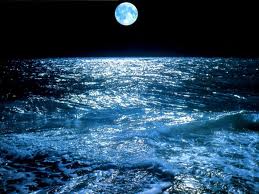‘To Bathe Their Hearts In Later Moonlight’
I keep thinking about this Wallace Stevens poem:
Homunculus et la Belle Etoile
In the sea, Biscayne, there prinks
The young emerald, evening star,
Good light for drunkards, poets, widows,
And ladies soon to be married.By this light the salty fishes
Arch in the sea like tree-branches,
Going in many directions
Up and down.This light conducts
The thoughts of drunkards, the feelings
Of widows and trembling ladies,
The movements of fishes.How pleasant an existence it is
That this emerald charms philosophers,
Until they become thoughtlessly willing
To bathe their hearts in later moonlight,Knowing that they can bring back thought
In the night that is still to be silent,
Reflecting this thing and that,
Before they sleep!It is better that, as scholars,
They should think hard in the dark cuffs
Of voluminous cloaks,
And shave their heads and bodies.It might well be that their mistress
Is no gaunt fugitive phantom.
She might, after all, be a wanton,
Abundantly beautiful, eager,Fecund,
From whose being by starlight, on sea-coast,
The innermost good of their seeking
Might come in the simplest of speech.It is a good light, then, for those
That know the ultimate Plato,
Tranquillizing with this jewel
The torments of confusion.
It’s a poem about abstraction and truth. The “evening star” is Venus. Stevens suggests that those captivated by love and sensuality — that is, an openness to the world of the senses — have more insight into the truth of things than philosophers, who approach things abstractly.
I especially like this part:
Until they become thoughtlessly willing
To bathe their hearts in later moonlight,Knowing that they can bring back thought
In the night that is still to be silent,
Reflecting this thing and that,
Before they sleep!
“To bathe their hearts in later moonlight.” I can’t say those words often enough! Notice what the poet is doing here. He says that philosophers, under the charm of Venus (the goddess of love and fertility, remember), will forget their critical distance, and partake of a kind of baptism; notice that innocence and cleansing is conferred upon the heart, not the head.
But if I’m reading the poem correctly, Stevens indicates that the philosopher may let himself go because he knows that later, he can process his experience through thought. I love the ambiguity of the word “reflecting” here: to reflect means to think about, but here it’s used to mean turning the light outward. It implies that rather than taking the light inside, the philosopher abstracts its lessons.
Plato taught that knowledge of reality only came by meditating on abstractions. Stevens, by contrast, insists that “the ultimate Plato” — that is, ultimate reality — is more reliably known through experience unmediated by thought. The poem is also a call to intellectual humility. Maybe the thing philosophers ultimately seek can be found in simple things — things you have to get past “the torments of confusion” to apprehend.
This poem speaks to me.


Subscribe for as little as $5/mo to start commenting on Rod’s blog.